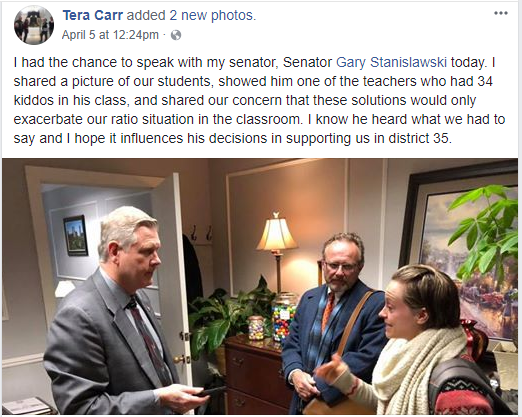Oklahoma teachers have walked out, and they’re not going back.
When I write that sentence, I feel at once incredibly frustrated and indescribably proud.
I’m frustrated that national media outlets have missed nuance and context that you can really only get from local sources (I see you, Tulsa World – keep up the good work!). I’m frustrated that state and federal politicians are making the insulting and inaccurate claim that teachers care more about their own household budgets than they do about the needs of their students. I’m frustrated that years of regressive tax policy and corporate handouts to oil and gas companies have drained the schools of revenue so badly that one in five Oklahoma public schools now operate a four-day week.
I’m proud that Oklahoma teachers, while they work in a “Right to Work” state in which legislators have done everything they can to kill unions, have kept a seat at the table through the tireless work of organizations such as TCTA. You’ll notice that TCTA names itself an “association” not a “union.” I could write another entire post on my feelings on that distinction (a debate that frequently preoccupied the minds and hearts of the DAE, another local teachers’ union I’m proud to have been an active member of).
However, that distinction (with or without a difference) is not the point today.
Today, the point is this:
I am eternally indebted to Oklahoma educators for shepherding me through my first two years of teaching (an on-the-job learning curve unlike anything else on Earth). I will forever be grateful for their compassion, their empathy and their dedication. Their mentorship and expertise guide me to this day. In case you are at all confused about why Oklahoma educators deserve to be treated better, here is a by-no-means comprehensive list of what they taught me:
*If you are new, veteran Oklahoma teachers will sacrifice their personal belongings (at a school where furniture is at such a premium that teachers scramble to move it from classroom to classroom, building to building, and/or home to classroom at the start of the year) to ensure that you start your very first school year with a functional classroom. At the end of your very first day, when you are collapsed with exhaustion, you will realize what a blessing it is to have a chair to sit in, a desk to put your computer on, and a bookcase to store the books you painstakingly selected and transported across the country from your own personal library (if you think any of that equipment is standard-issue, I assure you it was not, and I invite you to take a look at what the state legislature has done to Oklahoma school budgets).
*Veteran Oklahoma teachers will also take the time (while they are in the process of moving their own classroom to a completely different building) to look through their art collections so the students of the first-year teacher don’t have to stare at blank, white, institutional walls. When your sassy, future editor-in-chief sums up her first week in your journalism classroom by nakedly appraising the walls in the middle of class and saying, “Not bad for a first-year,” you will say a silent prayer of thanks for all those who donated motivational posters.
*When you have a personal health crisis and have to schedule an emergency doctor’s appointment during your 45-minute planning period, your next-door neighbor will volunteer to stand in the hallway between both classes to cover you until you get back. He will not ask questions. His calm, compassionate greeting when you get back will be the only comforting thing that happens that day.
*When you are meeting with a colleague to brainstorm how to get the Journalism Club off the ground, she will kindly inform you that no after-school events are held on Wednesdays, as that is church night, and she will not call you a East Coast heathen for not knowing that.
*When you are in the Assistant Principal’s office crying because you confiscated a child’s phone and then it disappeared out of your teacher’s desk and that freaks you out on several levels, your administrator (who was nearing year 50 as an Oklahoma educator and who is to this day one of the strongest women you will ever meet) will say to you, “Honey, you’re 22, and you’re halfway across the country from your family. I don’t think I could have done what you’re doing at your age.” You will suddenly feel a lot more resilient.
*Your Instructional Assistant, who will watch you struggle daily to control a rowdy class of freshmen, will tell you, “If I had a child at this school, I’d want them to be in your class,” and it will be the best compliment you have ever gotten.
*The librarian will take time out of her day to tell you how much she appreciates your weekly Friday visits (in which she claims those same rowdy freshmen are extraordinarily well-behaved), and you will feel a sigh of relief that perhaps you actually managed to be a tenth as graceful as your own mother, who worked at a library and effectively instilled both southern manners and a love of reading into your soul.
*You will be reminded by multiple staff members that you don’t actually have southern manners (D.C. walk-and-talk is very different than Oklahoma hospitality), and they will always be gracious about it. You will eventually learn how to bite your tongue and do small talk before asking your real question. This will prove an effective strategy later on in life. It will probably also make you a better, more patient person.
*You will learn that you cannot schedule a meeting (or a chat, or a check-in, or anything that involves words) with your freshman English colleague unless you plan for it to be three times as long as you planned it to be. In these sessions, you will always learn three times as much about life as you anticipated.
*Your building librarian and the local district librarian will go through a lot of extra work to support you when you decide to craft a research project around the Tulsa Race Riot, and all the time and effort they put into finding you primary and secondary sources will prove immeasurably valuable to your students’ perceptions of their own city.
*Your colleagues will work extra jobs. Sometimes more than one. They will do this while handling childcare and extra job responsibilities such as coaching. They will not complain. They will in no way be adequately compensated for the amount of work they perform outside of contract hours.
*Your colleagues will buy their own supplies. They will do this because they believe art is important. They will do this because they believe science matters. They will do this because they believe students should have food. They will not be compensated. They will not even ask. They know the school has no more supply money.
*When you come back to Tulsa to see your original class of freshmen graduate, the aforementioned Instructional Assistant will light up and say, “I know you want to see…” and she will point you toward a student who magically became a young man in the two years you’ve been gone. You will sit in the stands (pictured above – congratulations, Webster High School Class of 2013), and you will watch your students cross the stage, and you will look at the program and try to calculate how many names aren’t there that should be. Your school had a 50 percent dropout rate between freshman and sophomore year when you started as a first-year teacher. It has gone down. Not enough. It will never go down enough until the state legislature restores adequate funding to the schools. This walkout is not just about teacher salaries. (Teacher salaries aren’t just about teacher salaries, either – they’re about whether or not good people can afford to stay in the profession. They’re about whether or not teachers can feed their own families. They’re about whether or not we allow teachers to be respected professionals or we force them to work retail on evenings and weekends to pay the bills.) This walkout is about meeting student needs. It’s about taking care of the state’s future.
It’s time, Oklahoma legislators. It’s way past time to listen.



loved this
LikeLike